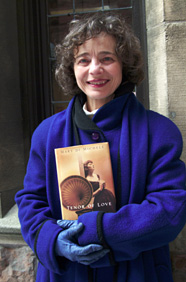Novelist Mary de Michele imagines famous opera singerís love life

Mary de Michele
Photo by Kate Hutchinson
Mary de Michele has written a novel inspired by the life of the great opera singer Enrico Caruso.
Tenor of Love, published in the United States by Simon and Schuster and Canada by Penguin, is an unabashedly sensual book by a writer who laughingly describes herself as a romantic feminist. “The poet in me is still working,” she said in an interview.
De Michele has published eight collections of poetry, but only one previous novel, Under My Skin. She has taught creative writing in the English Department for many years.
Caruso was indeed a tenor of love. De Michele’s novel is about his effect on three women who loved him.
The story starts in 1897, when the ambitious young Neapolitan singer met a prosperous Florentine family who helped advance his career. There were two young women in the Giachetti family, Ada and Rina, both singers in their own right.
In the novel, Rina sadly watches as Caruso partners her older sister on the stage, breaks up her marriage, gives her two children and gradually turns her into a housewife — an unmarried one, because divorce from her first husband was illegal. Eventually, Ada leaves and Rina takes over as Caruso’s lover and caregiver to his children.
The great singer isn’t portrayed as a cruel philanderer, but as a force of nature.
Caruso was the world’s first superstar, thanks not only to his talent but also to the advent of the gramophone. He became a regular at New York’s Metropolitan Opera, a household name, and a fabulously wealthy man. The second part of the book is from the point of view of the young New Yorker who became Caruso’s wife.
De Michele grew up with her father’s love of opera, and did a lot of research. “In terms of narrative, I’m always interested in what is true. Even in my poetry, I’m interested in dialogues with historical figures.”
However, it was the interior life of the women and the mythic quality of the great tenor that she wanted to focus on.
As she has created them, all three of Caruso’s lovers are aspects of her: Ada, the brash, ambitious older sister, Rina, the romantic, and Dorothy, the American, a quiet, bookish modernist. De Michele was born in Italy, and said that she changed from an outgoing, exuberant child to a quiet one when her family immigrated to Canada.
In the course of writing the book, de Michele, like her father, fell in love with opera, particularly the composer Puccini, who wrote La Bohème. Visiting the places Caruso had known helped her understand him better; drafts of the novel were written while she was poet in residence at the University of Bologna in 2003.
When she talks about writing, her face glows. The blank page is a bit daunting, she admitted, but “I love rewriting and developing.” As for the process of creating characters, “I’ve never been so high! I think writers are like actors, happy to be out of ourselves.”
Writing a novel rather than poetry was challenging but intriguing because of “the way time operates. It’s a different experience of history. It uses the reader’s memory — that’s what I love about the novel.”
In fact, she is already working on another historical novel, set during the Second World War, about Italian filmmaker Pier Paolo
Pasolini and his brother. For it, she’ll draw on her mother’s memories of being a girl virtually on the front lines of the conflict in Italy.
Writing about politics comes easily to her, and she feels it’s a good time for a book about fascism. “It deals with choice of art, politics and activism. I’m always interested in the choices women make.”
She already has a title: Unsaid.